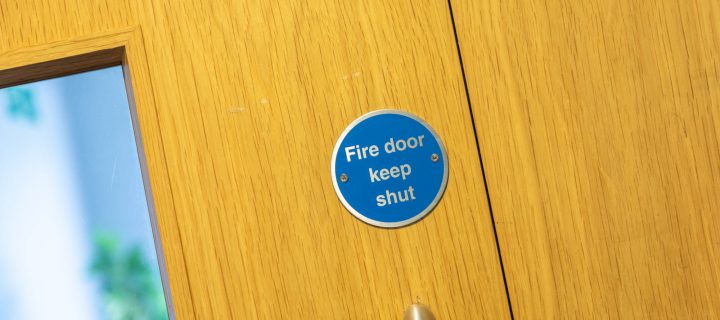Fire doors play a fundamental role in the overall fire safety of a building. Usually built from durable materials such as timber, steel, aluminium or gypsum, fire doors are designed to keep a fire contained in one place and give people time to safely evacuate.
In order to be considered a fire door, a door must be certified by a manufacturer after passing a number of fire safety tests. In all non-domestic properties, it’s a legal requirement to have fire doors in place, and it’s also important that these doors are kept closed.
If fire doors are not kept closed and a fire does occur, they are unable to do their job and can see fire and harmful fumes spread into other areas of the building. The only legal way in which a fire door can be kept open is if it has a fire door retainer installed. This device means that when a fire alarm is triggered, the door will automatically close to prevent the spread.
In this article, the team at KW Fire Protection will provide you with everything you need to know about fire doors.
Is the door a fire door or a fire exit?
It can be difficult to understand the difference between fire doors and fire exits, especially as both perform vital roles in fire safety. However, their roles do differ slightly.
The best way to tell the difference is to consider whether they’re internal or external. Fire doors are always internal, meaning they never lead outside. The purpose of fire doors is to create an escape route through a building in the event of a fire, contain the heat, flames and fumes from a blaze and compartmentalise a fire, preventing it from spreading and giving people time to evacuate.
Conversely, fire exits are always external and will lead you directly out of the building. The purpose of fire exits is to provide people with a quick, unobstructed escape if a fire does break out. These doors should be well-lit and easy to open, and they can be left open if required.
Should fire doors be self-closing?
Sometimes, fire doors can be self-closing if they are fitted with a device that means they close by themselves when people are moving in and out of the room. Not all fire doors need to be self-closing, but there are some circumstances when it will be required.
Self-closing fire doors are needed when:
- They’re subdividing escape routes into exits over two or more storeys
- When subdividing corridors every 12m in length
- Subdividing a dead-end condition in a common corridor exceeding 4.5m in length
- Keeping a staircase protected from circulation space
- When the doors open onto the external stairs
- In residential buildings like care homes, hotels, student accommodations and more
- Buildings that house flats should have self-closing fire doors fitted to each flat’s front door
If you need self-closing fire doors installed on your property, you should always call on the services of a professional fire safety organisation.
Why shouldn’t fire doors be wedged open?
As previously mentioned, in order to work effectively, fire doors should always remain closed. If not, a fire will be able to spread quickly, and it will be harder to contain it. Despite this, sometimes people will wedge fire doors open for a whole host of reasons. Whatever the case, it should not be done.
If you do prop open a fire door and a fire then occurs, the consequences could be devastating. In fact, if someone’s life is at risk as a result of a fire door being wedged open, this could lead to financial and criminal penalties being imposed. As well as this, it’s likely that your building’s insurance will be invalidated if a fire occurs and fire doors have been wedged open.
At KW Fire Protection, we’re experts in all aspects of commercial fire safety. This includes fire doors, with our range able to provide fire resistance from 30 minutes to up to two hours. Operating across Manchester, Oldham, Bolton and the surrounding areas, please get in touch with our expert team today to find out more.









